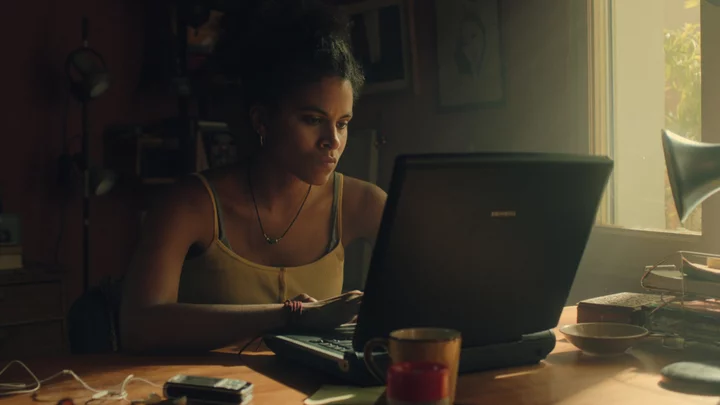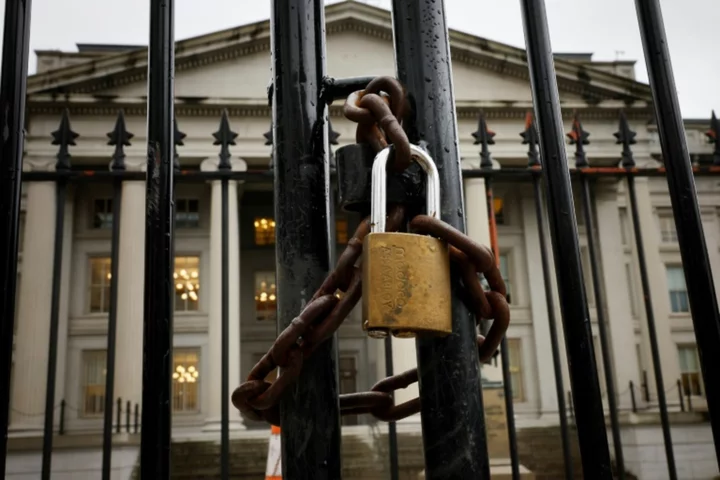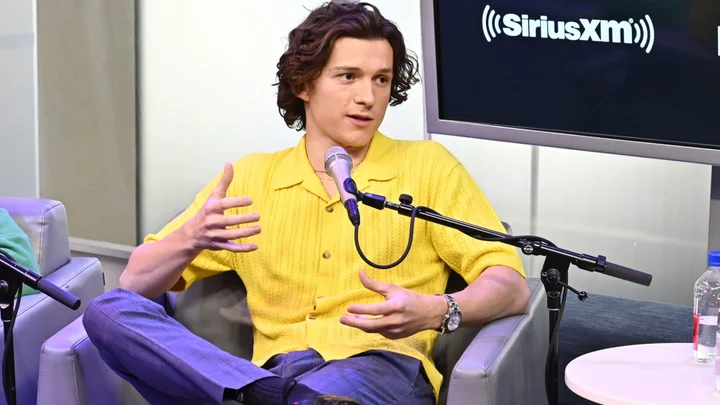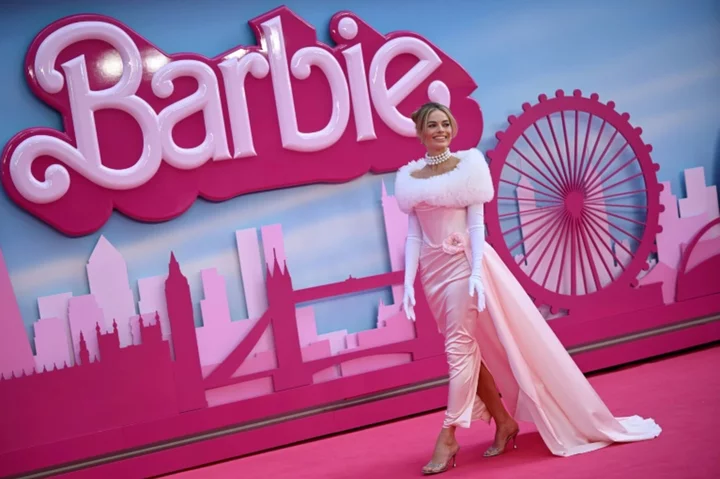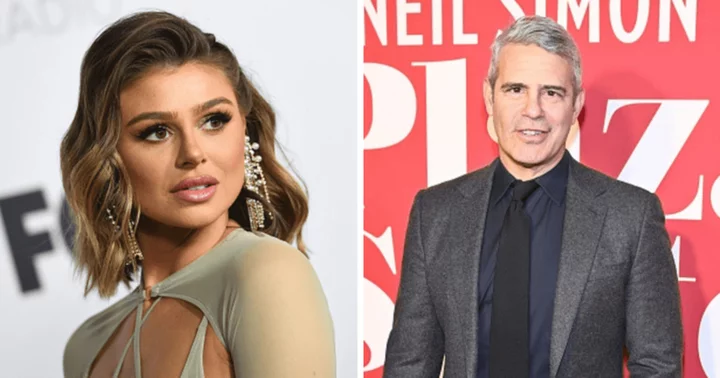We can all agree that "Mazey Day" is a huge shift in Black Mirror's tone.
Rather than leaning into the show's usual sci-fi twists, this episode of Season 6 of Black Mirror gave us horror surprisingly mixed with fantasy. Set in 2006, aka the year of iPods, Ed Hardy, and most importantly, paparazzi, "Mazey Day" follows Bo (Zazie Beetz), a pap photographer who's struggling with whether or not she wants to stay in the business.
In parallel to Bo's storyline is Mazey Day (Clara Rugaard), an acclaimed actress who's working on a period drama in the Czech Republic. All is well for Mazey until she mysteriously ditches production one day and returns home to the U.S. to an undisclosed location. In the episode, we learn that it's been two weeks since anyone's seen Mazey and news outlets are willing to pay well for anyone who gets the first picture of her (an added bonus if they catch her looking like a "junkie.").
SEE ALSO: Every 'Black Mirror' episode ever, ranked by overall dreadThe public is hungry and ready to rip Mazey to shreds, and Bo needs the money, so she pursues the elusive star. Unfortunately for this morally questionable photographer, Mazey's also really hungry herself.
What happens in "Mazey Day"s ending?
Credit: NetflixAt the start of the episode, we watch Mazey take magic mushrooms and drink wine in her lodgings before going for a drive for cigarettes. Behind the wheel, she hallucinates, loses control, and hits something with her car. For a large portion of the episode, we're made to believe that Mazey accidentally hit a person and ran, the guilt of it all seeing her leaving set mid-production and going home to America, under the guise of treatment for a presumed drug addiction.
Meanwhile, Bo pieces together that Mazey's possibly in a fancy rehab facility, so she decides to break into the fully-booked Cedar Wood Retreat along with her paparazzi colleagues. This is where things get really weird. Bo and co. find Mazey with a chain around her neck in a barn-like room with goats (yes, literal goats) chilling in the corner. At this point, we're all thinking that Mazey's a victim of some terrifying guru, but things somehow manage to get even worse when Mazey...turns into a werewolf.
Rather than running from the snarling, flesh-eating beast, the paps want that all-important photo of Mazey-wolf — can you imagine the money they'd get for that TMZ headline?! But Mazey does as werewolves do and rips everyone to shreds, except for Bo who ultimately shoots and wounds her. Mazey turns back into her human form and asks Bo for her gun, after which it's largely insinuated that Mazey dies by suicide (but not before Bo snaps a picture of her in the moment).
How did Mazey become a werewolf?
Essentially, she was bitten by the one she hit.
During Mazey's cursed drive, you'll realize upon a second watch that the evening plays out during a full moon — you can see it in the sky just after her crash, looming above the forest behind a veil of mist. Mazey has a foggy memory of getting out of her car and finding an injured wolf growling at her where she expected a person, but the next day she's told the authorities found a man dead on the road. On that fateful night, Mazey actually hit a werewolf, who presumably bit her and turned her into part of the pack.
Featured Video For You 'Black Mirror' predicted this iPhone X feature and it's really creepyWere there any clues? This is Black Mirror, of course there were. One hint at Mazey's condition is the scene in which her doctor comforts her in a semi-destroyed room, saying "It has taken you over," and that she only needs to get through the next two nights before possibly feeling better. This foreshadows Mazey's mood is linked to the lunar cycle — full moons last upwards of three days.
Plus, there are goats in Mazey's room at Cedar Wood Retreat — literally her snack for whenever she enters full beast mode.
My favorite clue in the episode, however, is Muse's "Supermassive Black Hole" playing both in Mazey's lodgings and through her car speakers during her drive. Cultural connoisseurs will know that this is also the song that plays during Twilight's pop culture-defining baseball scene. Now, I'm not going to assume the song choice was intentional, but it unfortunately makes a lot of sense. A song used in a franchise about werewolves and vampires, that arguably defined one of its most famous scenes, being used again in a Black Mirror episode about werewolves? One can only dream for that incoming Cullen crossover.
What is the point of "Mazey Day?"
Credit: Nick Wall/NetflixWhile the episode deals with something fantastical and out of the ordinary, its main theme is actually grounded in our own reality. The early 2000s were riddled with toxic paparazzi culture, and most of us are now familiar with the celebrity harassment, disregard for mental health and personal privacy, and character assassinations that defined it. It was (and we're not out of the woods yet) a ruthless media environment, where spectacle ruled over sympathy, and no story was off limits so long as it made a publisher money.
Mazey's story at first plays into the era's archetypes, namely its fixation on vandalizing the image of an "American sweetheart," with ravenous media vilifying and objectifying her as a spectacle for the public to gawk at. She's basically a stand-in for how celebrities, mostly women, were (and honestly, still often are) treated during that time, Britney Spears being a now obvious example.
The A-lister's lycanthropic fate hyperbolizes the episode's theme, poking fun at the extreme lengths paps were willing to go for a snap during the early 2000s despite the health and privacy of their target. It doesn't matter if there's a ravenous beast about to strike them, the pictures are going to be worth a million bucks!
Sure, "Mazey Day" may have dipped into fantasy, a genre not typically explored by Black Mirror, but the episode's overarching skewering of paparazzi and celebrity culture fill us with the same existential dread we know and love.
How to watch: All seasons of Black Mirror are streaming on Netflix.

